Gov. Tony Evers’ administration let federal supplies (including testing kits) for a major COVID-19 surge testing center sit unused for more than a week even though the center was designated for the Neenah area, which was seeing an explosion in cases, according to emails obtained by Wisconsin Right Now and an interview with a state senator.
“They sat on it for eight days,” despite the explosion in COVID-19 numbers in the Fox Valley, state Sen. Roger Roth, R-Appleton, told Wisconsin Right Now, of the Evers’ administration. Roth believes the delay was unconscionable at a time of surging COVID-19 numbers, with Wisconsin an epicenter of national coronavirus concern. “After talking with the governor’s administration, it became clear there was no sense of urgency for this testing site, and it would likely not be deployed for at least three weeks,” Roth said.
The three-week time frame cited by Roth would mean the testing center wouldn’t have gone up before the election; a quick response could have muddied the Democratic narrative that President Donald Trump is responding slowly to COVID-19. Roth said the Trump administration responded quickly when he raised concerns about COVID-19 in the Fox Valley. Roth says he then took charge of state efforts in getting it up because Evers’ administration was slow walking it, and he felt waiting jeopardized public safety. The federal government provides the resources for such testing centers, but the states the logistics in getting them up.
Roth said the Evers’ administration was “unhelpful at every turn.”
The testing kits arrived from the federal government on Oct. 7 and PPE arrived on Oct. 8, according to an email from Tiffany Bilderback, US Army major. The surge testing center was formally unveiled to the public on Oct. 16 and local TV reported it wasn’t fully operational until Oct. 21. Roth’s office says a federal surge site can be up in 72 hours. But that didn’t happen here.
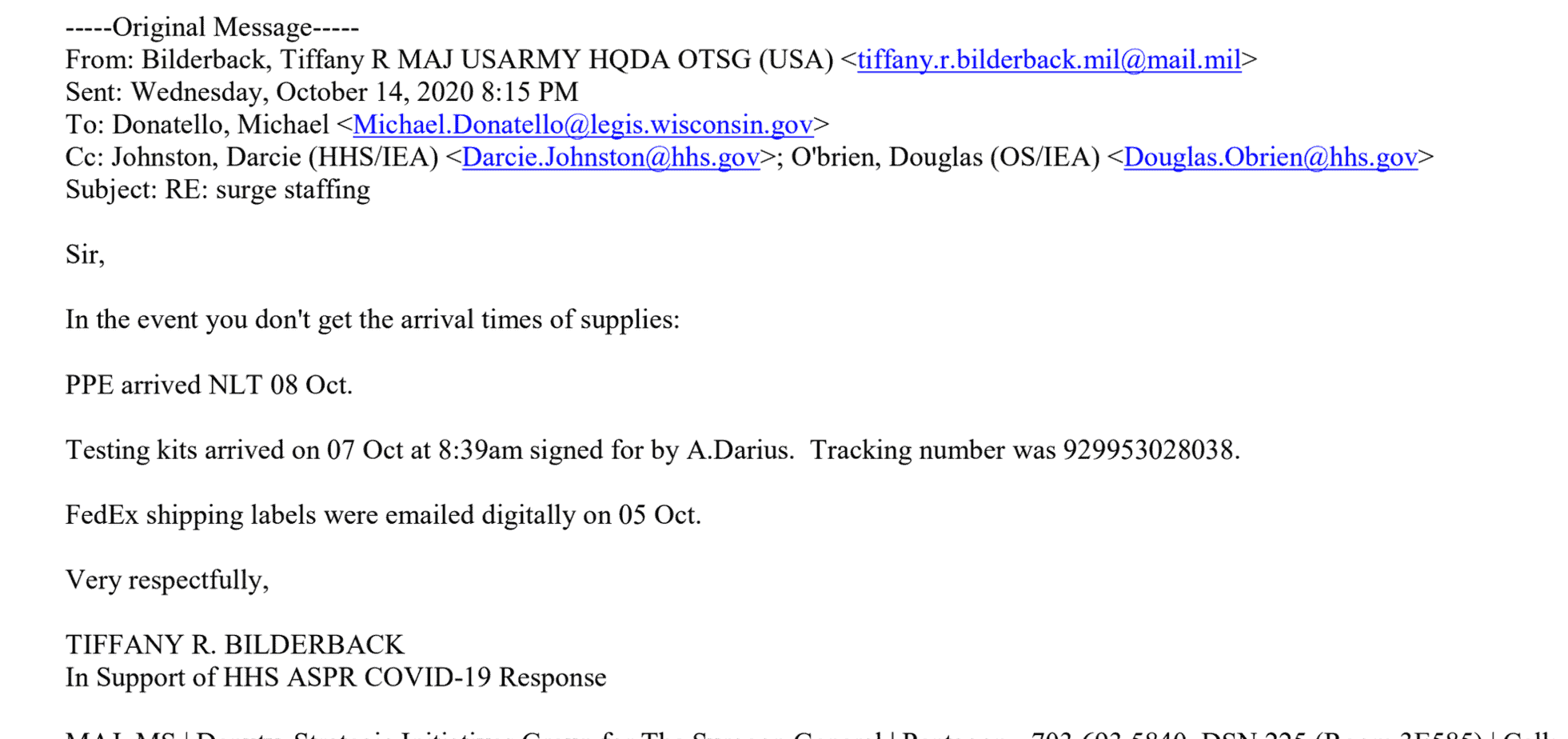
“There it sat for eight days with no movement with all of these things happening around Wisconsin,” said Roth. The testing center is now up and running. We reached out this morning to the Evers’ administration, a key Evers’ official on the emails, the White House, U.S. Department of Health & Human Services, and Trump campaign.
“October 7 is the date HHS’ FedEx tracking shows the 30,000 test kits to support the Wisconsin surge testing site was received by the Evers Administration,” said Mia Heck, director of external affairs for HHS. “A time delay is for others to characterize. The test kits were received on October 7 and the COVID-19 testing surge sight became operational on October 16.”
“From day one, President Trump has worked at historic speed to ensure every state, including Wisconsin, was supplied with the PPE, life-saving therapeutics, and state-of-the-art testing needed to support and protect its citizens,” responded – White House Director of Media Affairs John Horstman. “In addition to the tremendous level of federal resources that the President has already supplied to the people of Wisconsin, he is now immediately surging 250,000 additional coronavirus tests to the state to protect the health and safety of Wisconsinites, with particular attention to high-risk individuals. President Trump is sparing no effort or expense to save millions of American lives.”
We never heard back from the Evers’ administration’s press office or official.
The center finally kicked off with fanfare on Oct. 16, according to a ThedaCare press release that singles out Roth, the U.S. Surgeon General, ThedaCare and “community partners” for praise.
On Oct. 9, Roth wrote a letter to Gov. Tony Evers, “Some of the supplies, like the testing machines and kits, have already been sent directly by HHS to our local hospitals with more on the way. Other resources like the mobile testing center and support staffing require state action to implement, with that action still pending.”
His letter continued, “I have been made aware that materials for the mobile testing center, which can be up and running over a period of 72 hours and provide up to 5,000 daily tests to our community, have been shipped to Wisconsin, however, further action is required by the Wisconsin Department of Health Services (DHS) regarding a site determination and staffing implementation. Local hospitals have identified a potential site location, but DHS must transmit that information to HHS.” He then requested to speak with Evers.
But still it sat.
Four days later, on Oct. 13, federal officials were still trying to get answers from state officials and the Evers’ administration about the testing center, an email trail shows. The emails also show a state official indicated that Fox Valley officials (who were not named) preferred to use state testing kits over the federal resources, even though the federal supplies were already in the state.
On Oct. 13, Darcie L. Johnston, director of Intergovernmental Affairs for the U.S. Department of Health and Human Services, wrote Wisconsin Secretary of the Department of Health Services (DHS) Andrea Palm and state DHS official Julie Willems Van Dijk and sought an update on the surge testing site. “Hi Secretary Palm and Commissioner Willems Van Dijk, I’m just checking in to see if you were able secure a location and volunteers for a surge testing site in NE, Wisconsin area?” she wrote.
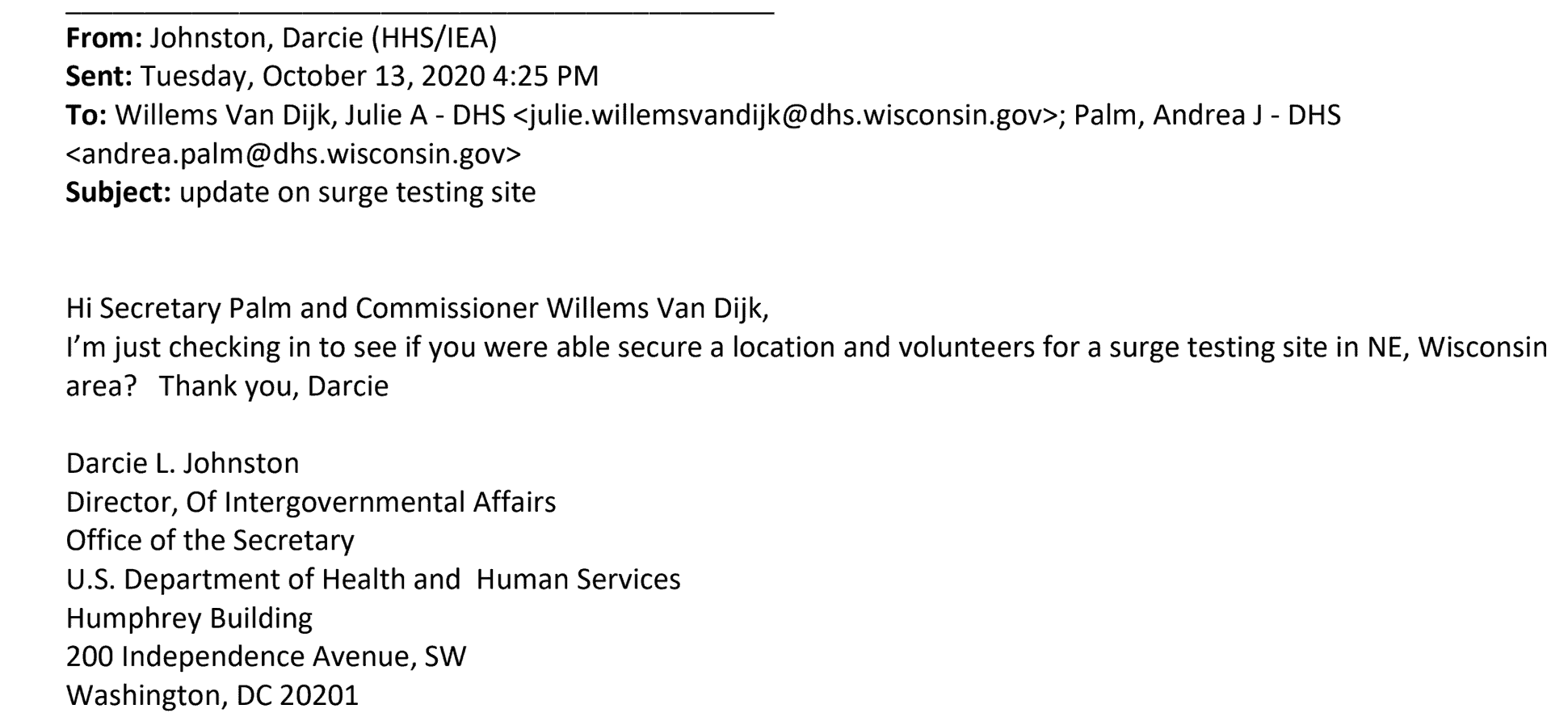
An Oct. 13 email Johnston to Maggie Gau, Tony Evers’ chief of staff, says, “Hi Maggie, Here are the 3 hospital who have offered to provide land to host a surge testing site. I gave these to Sec. Palm and Julie last week. The PPE, testing supplies including BiNax test cards arrived in Madison last week. In addition we shipped Abbott ID NOW instruments to a number of hospitals with tests. We would very much like to confirm testing locations and logistics plan for a surge site or sites. Please let me know how we can help?”
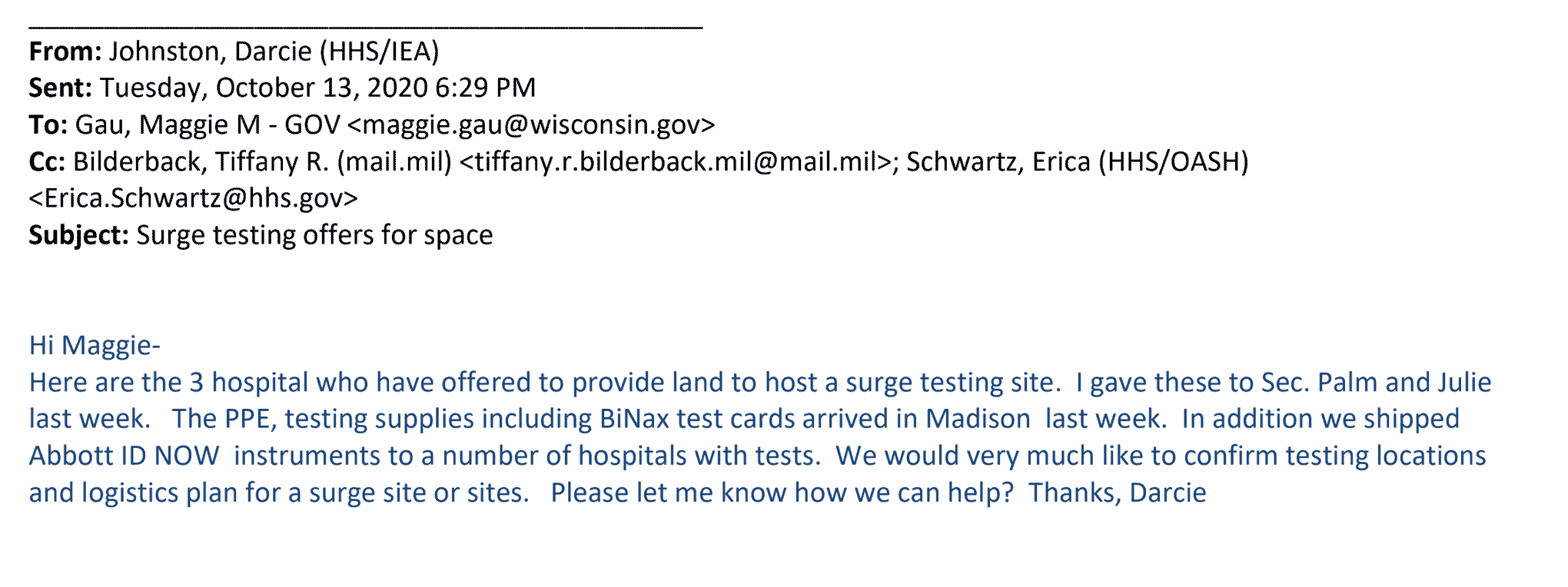
An Oct. 6 email from Johnston shows she forwarded the state “offers to host a surge testing site” on that date. On Oct. 7, a federal official wrote Roth’s office, “Below please find an update on the Abbott ID Now machines and supplies that have been send (and mostly already delivered) to the Northeast WI Hospitals we talked to on Friday.” By Oct. 14, an official in Roth’s office was writing the feds that they were trying to push the state to “move on this.”
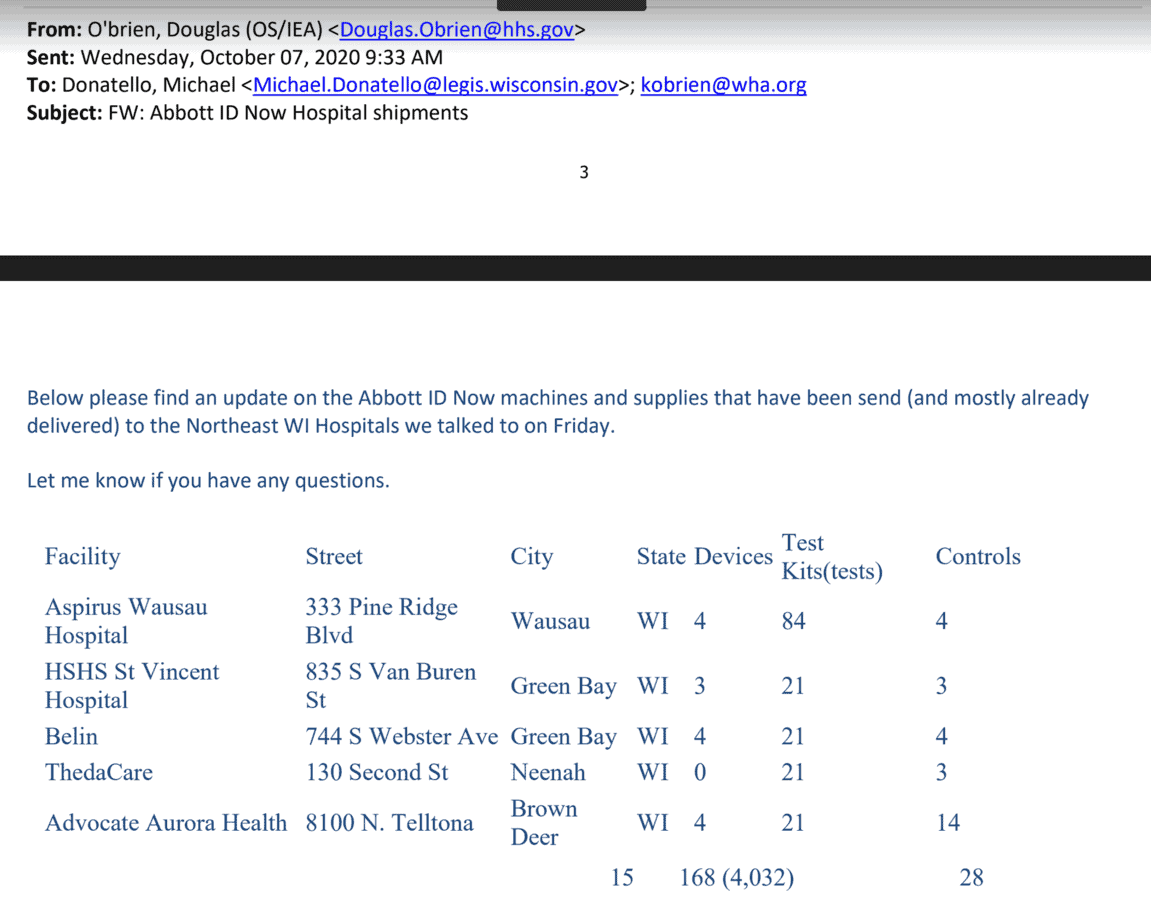
That same day, Johnston also wrote Palm and Willems Van Dijk, writing, “Julie, I want to make sure you are clear that the tests and PPE that was shipped to Madison cannot be used in the ‘state’s’ testing system. Please confirm that this has not happened? …We are waiting on location or locations and logistics plan for surge testing in NE, Wisconsin. Were any of the donate hospital sites options? When will you have an ETA on the locations and a logistics plan?
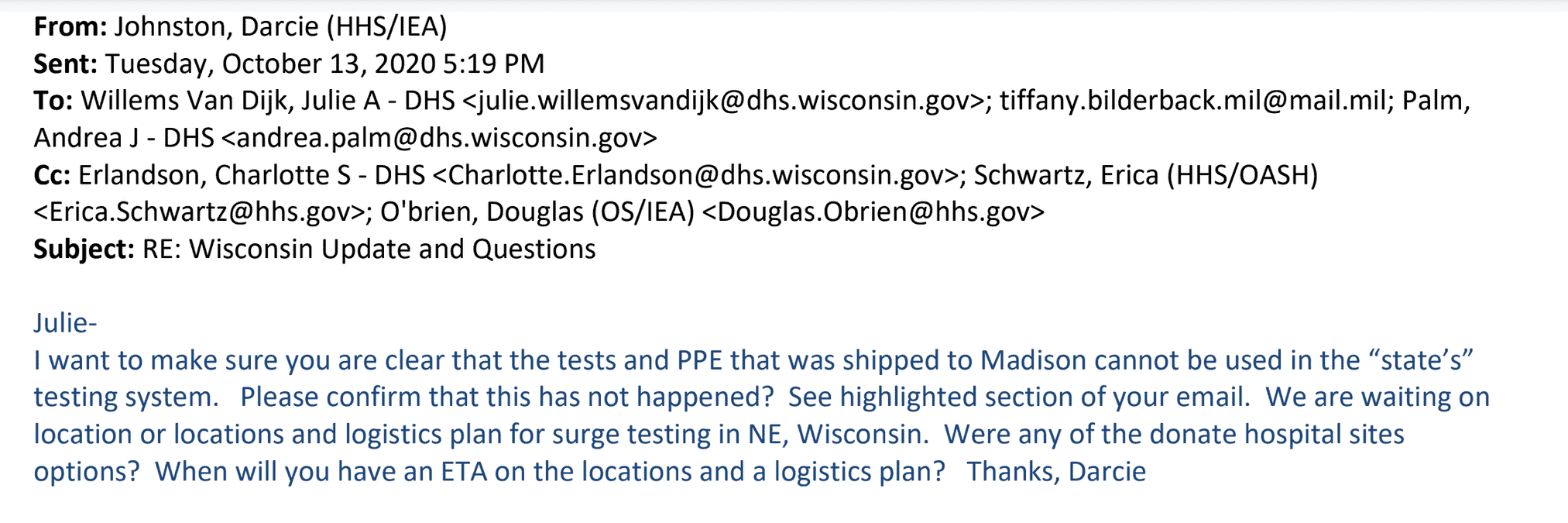
Johnston’s concern that the tests were used in the state’s testing system derived from the last line in this email from state official Willems Van Dijk, who wrote Johnston on Oct. 10: “I wanted to provide an update on where we are at with mobilizing the HHS surge testing resources in Wisconsin. Secretary Palm and I had productive conversations with local elected officials in Green Bay/Brown County and the Fox Valley Region (Outagamie/Calumet Counties and the Cities of Appleton, Menasha, Neenah, and Kaukana) on Thursday evening. Both groups expressed interest in deploying this asset. The Fox Valley officials are meeting on Monday morning to finalize their plan. Green Bay/Brown County wanted to consult with their hospitals. I have a meeting with one of those hospitals (Aurora BayCare) scheduled for Monday morning. In addition, we are working with our testing team to deploy these resources to other communities around the state who are increasing testing.”
She asked several questions about testing eligibility and asked “over what period of time these supplies will be available,” adding, “I will continue to keep you apprised of our progress in opening sites–hopefully this week.”
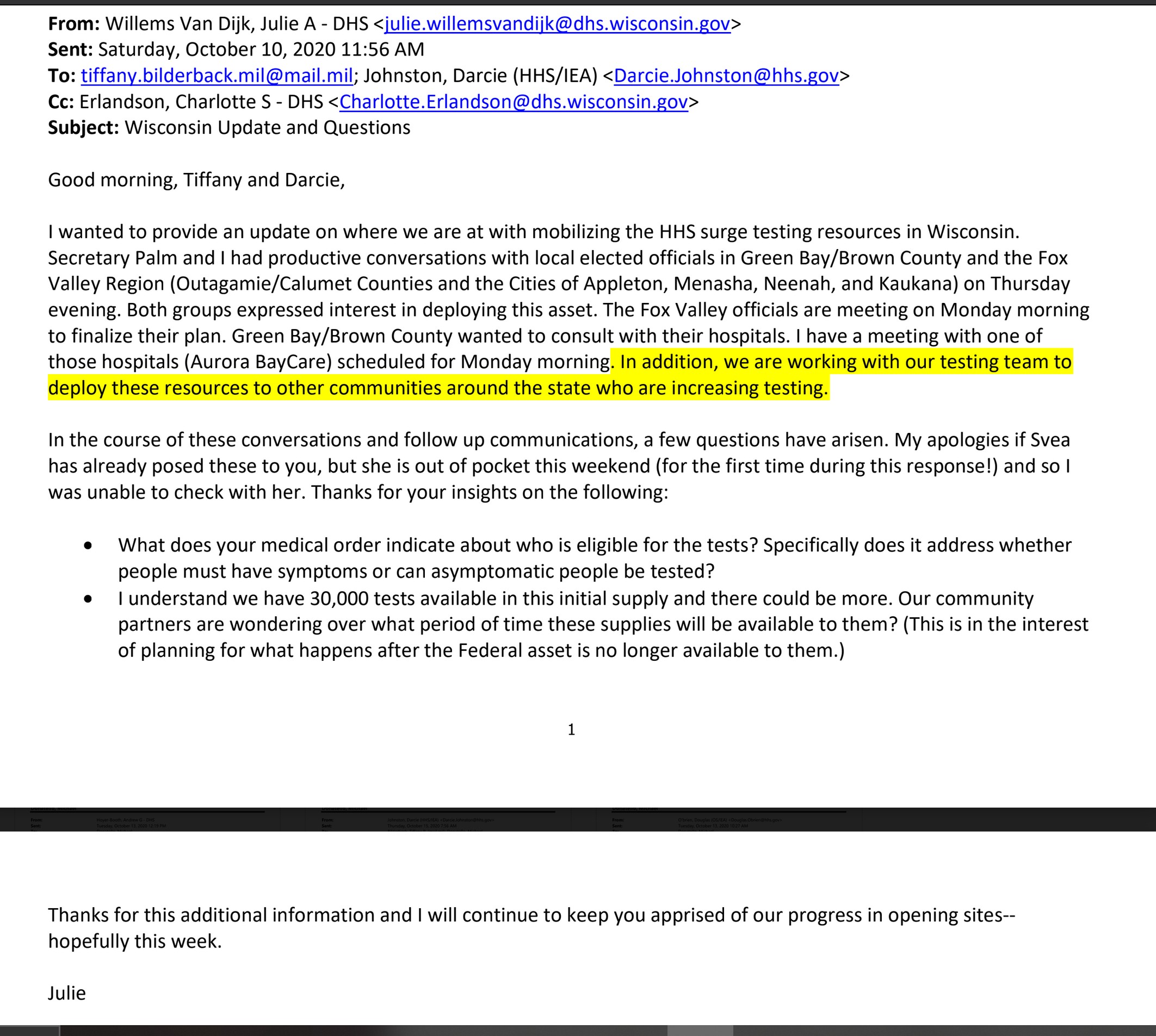
On Oct. 13, another state official, DHS legislative director Andrew Hoyer-Booth, wrote Roth that DHS was on a “dual track to increase testing” in the Fox Valley using state-purchased tests and “deploying the HHS surge tests.” He then listed two National Guard collection sites that were starting that Thursday and stated, “We continue to reach out to identify opportunities to deploy the additional HHS surge kits.” He said they were doing such things as discussing the opportunity for testing sites at UW campuses, reaching out to federally qualified health centers, and reaching out to elected officials. He added, “Fox Valley officials have indicated they prefer to use the Wisconsin National Guard/state resources to expand testing…” However, that was four days after Roth’s letter saying supplies had arrived.
“Testing is a critical component in our battle against COVID-19,” said Surgeon General Dr. Jerome Adams, according to the press release when the center eventually got up and running. He came to Neenah for the announcement. According to WBAY, the testing center allowed for 30,000 tests administered by the Wisconsin National Guard. That story said the testing center would not be fully operational until Oct. 21.
According to Roth, who spoke with Wisconsin Right Now in a lengthy phone interview, healthcare officials in the Neenah area first raised the alarm about “this coming COVID-19 storm” around Sept, 30, so he got on the phone with the White House to let them know what people were saying.

The White House quickly got some of the nation’s top COVID-19 officials involved, including Admiral Brett Giroir, who has been called the Trump administration’s COVID-19 “testing Czar” by CNN. Roth said he wanted the admiral to hear the stories of healthcare officials, who were worried about staffing, hospital capacity, as well as growing cases. “They were predicting a surge, and you’re seeing it,” Roth added, saying the White House and local healthcare officials were together on the call.
An Oct. 1 email from Johnston documents this outreach. It says she was asked to set up a call with Roth and “your four hospital executives” on Oct. 2 with “Adm. Giroir, who leads testing strategy for the WH Task Force.”
We wrote to Johnston and asked for comment but didn’t hear back. An Oct. 14 email to Johnston from a U.S. Army Major explained the state’s role when asked who was responsible for set up, saying, “Whoever the state has do it. Some states it has been the national guard. Some states the fire department. Some states public health.”
The admiral then said that there was plenty of testing but it’s all managed locally. “It’s state supported and federally resourced,” said Roth. But he said there was a “disconnect with the locals, in this case the State of Wisconsin.”
The federal officials said “we can get you testing.” According to Roth, they “overnighted testing equipment to several hospitals and tests immediately as a result of phone calls.” The “surge testing center” for Neenah was capable of five ancillary sites and stated it could be “operational in 72 hours,” said Roth. “This is the federal government riding to the rescue, but everything has to be locally managed.”
And that’s where he says it all broke down.
He also says the state wasn’t active enough in trying to obtain federal resources on the front end.
“None of the people even knew these things were possible,” said Roth. “No one at the state level was reaching out to the locals.”
He said the state was providing misleading information to some of the health care providers. Eventually, he decided, “that’s enough. I’m sick of this. This testing center is sitting collecting dust.”
Roth then took charge of it, he said, and worked around the Evers’ administration by calling “everyone I knew across the health care system,” and eventually secured ThedaCare in the Fox Valley, which got it “up and operational in 36 hours.”


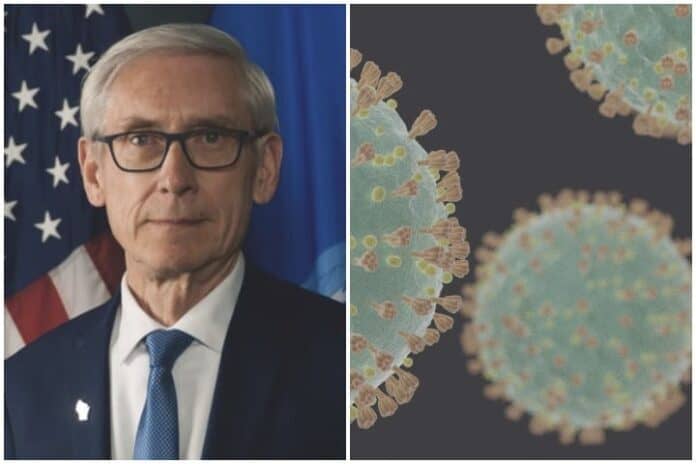


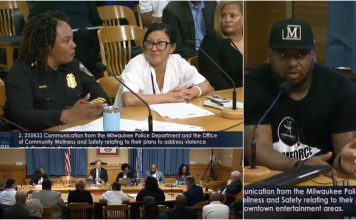


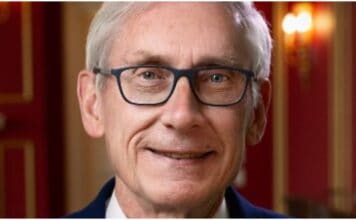



![Governor Caught Playing Politics with Brillion Residents’ Lives & Livelihood [COLUMN] ron tusler](https://www.wisconsinrightnow.com/wp-content/uploads/2025/07/MixCollage-15-Jul-2025-03-35-PM-9568-356x220.jpg)

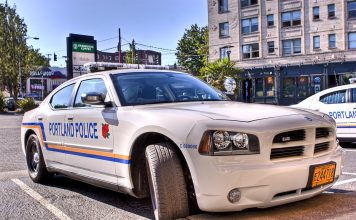
![Protecting Portland: No Good Deed Goes Unpunished [REVIEW]](https://www.wisconsinrightnow.com/wp-content/uploads/2025/07/portland-356x220.jpg)

















